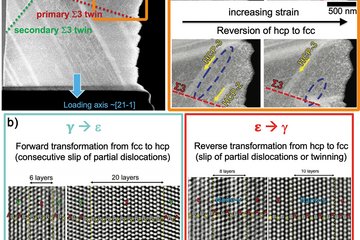All genres
21.
Journal Article
Sustainable generation of hydrogen using chemicals with regional oversupply - Feasibility of the electrolysis in acido-alkaline reactor. International Journal of Hydrogen Energy 39 (29), pp. 16275 - 16281 (2014)
22.
Journal Article
Coupling of a scanning flow cell with online electrochemical mass spectrometry for screening of reaction selectivity. Review of Scientific Instruments 85 (10), 104101 (2014)
23.
Journal Article
Dissolution of noble metals during oxygen evolution in acidic media. ChemCatChem 6 (8), pp. 2219 - 2223 (2014)
24.
Journal Article
Temperature-dependent dissolution of polycrystalline platinum in sulfuric acid electrolyte. Electrocatalysis 5 (3), pp. 235 - 240 (2014)
25.
Journal Article
The impact of dissolved gases on platinum dissolution in acidic media. Electrochemistry Communucations 40, pp. 49 - 53 (2014)
26.
Journal Article
Rational design of the electrode morphology for oxygen evolution - enhancing the performance for catalytic water oxidation. RSC Advances 4 (19), pp. 9579 - 9587 (2014)
27.
Journal Article
Oxygen electrochemistry as a cornerstone for sustainable energy conversion. Angewandte Chemie International Edition 53 (1), pp. 102 - 121 (2014)
28.
Journal Article
Die Elektrochemie des Sauerstoffs als Meilenstein für eine nachhaltige Energieumwandlung. Angewandte Chemie 126 (1), pp. 104 - 124 (2014)
29.
Journal Article
A comparative study on gold and platinum dissolution in acidic and alkaline media. Journal of the Electrochemical Society 161 (12), pp. H822 - H830 (2014)
30.
Journal Article
Effect of temperature on gold dissolution in acidic media. Journal of the Electrochemical Society 161 (9), pp. H501 - H507 (2014)
31.
Journal Article
Impact of the spatial distribution of morphological patterns on the efficiency of electrocatalytic gas evolving reactions. Journal of the Serbian Chemical Society 79 (3), pp. 325 - 330 (2014)
32.
Journal Article
On the faradaic selectivity and the role of surface inhomogeneity during the chlorine evolution reaction on ternary Ti–Ru–Ir mixed metal oxide electrocatalysts. Physical Chemistry Chemical Physics 16 (27), pp. 13741 - 13747 (2014)
33.
Journal Article
Towards a comprehensive understanding of platinum dissolution in acidic media. Chemical Science 5 (2), pp. 631 - 638 (2013)
34.
Journal Article
Gold dissolution: Towards understanding of noble metal corrosion. RSC Advances 3 (37), pp. 16516 - 16527 (2013)
35.
Meeting Abstract
Stability of binary metallic ceramics in the HER reaction - feasible HER electrocatalysts in acidic medium? In Abstracts of Papers of the American Chemical Society, 254, 350. 254th National Meeting and Exposition of the American-Chemical-Society
(ACS) on Chemistry's Impact on the Global Economy, Washington, DC, August 20, 2017 - August 24, 2017. (2017)
36.
Talk
From Fundamental Electrocatalytic Studies to Half-Cell Investigations of Electrode Performance. ECS Conference 2015, Glasgow, Scotland, UK (2015)
37.
Talk
Electrochemical CO2 Reduction: A Combinatorial High-Throughput Approach for Catalytic Activity, Stability and Selectivity Investigations. International Conference on Combinatorial Materials Research, Ghent, Belgium (2015)
38.
Talk
Platinum electrochemial dissolution and its consequences for platinum electrocatalysis. 227th ECS Meeting, Chicago, IL, USA (2015)
39.
Talk
Combinatorial study of fundamental electrocatalyst performance - The scanning flow cell coupled to online analytics. 227th ECS Meeting, Chicago, IL, USA (2015)
40.
Talk
Perspectives for design of active and stable oxygen evolution electrocatalysts. 227th ECS Meeting , Chicago, IL, USA (2015)










